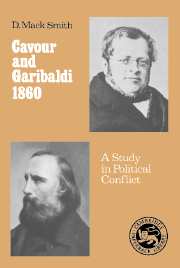Book contents
- Frontmatter
- Contents
- Preface
- Abbreviations
- Introduction
- Chapter I Political opinions in Sicily: April–June 1860
- Chapter II Cavour and the diplomats: April–June
- Chapter III La Farina and Crispi: June
- Chapter IV Arguments for and against annexation
- Chapter V Arguments over ways and means
- Chapter VI Crispi loses the first round: June
- Chapter VII Cavour loses the second round: July
- Chapter VIII Cavour adjusts his policy: July
- Chapter IX Depretis begins his prodictatorship: July
- Chapter X Cavour plans a revolt at Naples: July
- Chapter XI Cavour fails at Naples: August
- Chapter XII Political differences in Sicily: August
- Chapter XIII Cavour forces Depretis to a choice: 1–8 September
- Chapter XIV Depretis fails to persuade Garibaldi: 8–14 September
- Chapter XV Garibaldi succeeds at Naples: 1–15 September
- Chapter XVI Cavour breaks with Garibaldi: September
- Chapter XVII The radicals at bay: September
- Chapter XVIII Mordini the new prodictator: 17–25 September
- Chapter XIX Further controversy over annexation: September–October
- Chapter XX Mordini summons an assembly: 5 October
- Chapter XXI Pallavicino fights for a plebiscite: 8 October
- Chapter XXII Parliament supports Cavour: October
- Chapter XXIII Mordini changes his mind: 9–13 October
- Chapter XXIV Garibaldi makes his decision: 9–13 October
- Chapter XXV The plebiscite in Sicily: October
- Chapter XXVI The doubtful significance of the vote: October–November
- Chapter XXVII Cavour's government in the south: November–December
- Chapter XXVIII Conclusion
- Index
Chapter XXVIII - Conclusion
Published online by Cambridge University Press: 30 October 2009
- Frontmatter
- Contents
- Preface
- Abbreviations
- Introduction
- Chapter I Political opinions in Sicily: April–June 1860
- Chapter II Cavour and the diplomats: April–June
- Chapter III La Farina and Crispi: June
- Chapter IV Arguments for and against annexation
- Chapter V Arguments over ways and means
- Chapter VI Crispi loses the first round: June
- Chapter VII Cavour loses the second round: July
- Chapter VIII Cavour adjusts his policy: July
- Chapter IX Depretis begins his prodictatorship: July
- Chapter X Cavour plans a revolt at Naples: July
- Chapter XI Cavour fails at Naples: August
- Chapter XII Political differences in Sicily: August
- Chapter XIII Cavour forces Depretis to a choice: 1–8 September
- Chapter XIV Depretis fails to persuade Garibaldi: 8–14 September
- Chapter XV Garibaldi succeeds at Naples: 1–15 September
- Chapter XVI Cavour breaks with Garibaldi: September
- Chapter XVII The radicals at bay: September
- Chapter XVIII Mordini the new prodictator: 17–25 September
- Chapter XIX Further controversy over annexation: September–October
- Chapter XX Mordini summons an assembly: 5 October
- Chapter XXI Pallavicino fights for a plebiscite: 8 October
- Chapter XXII Parliament supports Cavour: October
- Chapter XXIII Mordini changes his mind: 9–13 October
- Chapter XXIV Garibaldi makes his decision: 9–13 October
- Chapter XXV The plebiscite in Sicily: October
- Chapter XXVI The doubtful significance of the vote: October–November
- Chapter XXVII Cavour's government in the south: November–December
- Chapter XXVIII Conclusion
- Index
Summary
The government was going to recover much of its lost ground in the first months of 1861, when by hook and crook the ministerial party won a convincing success in the parliamentary elections. But although Cavour had relied heavily on a victory in parliament, this meeting of a new legislature was not automatically going to bring about the magical results he had expected. Soon afterwards, early in June 1861, Cavour died, still a comparatively young man and at the height of his powers. In the feverish activity of his last months he could never turn his attention properly to the southern question, and when he died he had still not found the time to consider in detail what other policy except a negative repression would serve to integrate these provinces into the old kingdom of Sardinia.
The unhappy state of the south was thus described by a former prime minister of Piedmont, Massimo d'Azeglio, in August 1861:
at Naples we overthrew a sovereign in order to set up a government based on universal suffrage. And yet we apparently need sixty battalions to hold the people down, and it seems that even this number is not enough.…
Suffrage or no suffrage, there is no need of battalions of troops this side of the River Tronto, only beyond it. The only conclusion is that there must have been some error in the plebiscite, and we must accordingly change our ideas and our practical policy. We must ask the Neapolitans once again whether or not they do want us there.
- Type
- Chapter
- Information
- Cavour and Garibaldi 1860A Study in Political Conflict, pp. 434 - 444Publisher: Cambridge University PressPrint publication year: 1985



